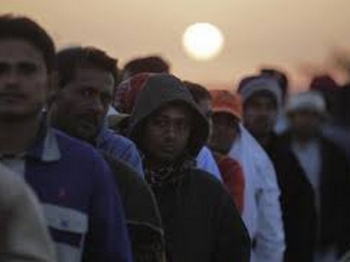The plight of refugees and the Church’s mission

The picture of the Syrian child whose body was found washed up on the beach, which was widely circulated by the media, as well as the tragedy of 71 migrants from the Middle East who were suffocated to death in a refrigerated lorry in Austria, have caused a shock and awareness in European public opinion at the end of this summer. Cardinal Christoph Schönborn, the Archbishop of Vienna and Knight Grand Cross of the Order of the Holy Sepulchre, has spoken in favor of welcoming our “human brothers and sisters” at all levels, while barriers are being erected to stop their way. During the Angelus on September 6, the Sunday following these events, the Pope specifically asked that every parish, religious community, monastery and sanctuary in Europe, welcome one family of refugees. The tragedies in the Middle East closely concern European citizens. In the name of the mission of the Church, members of the Order of the Holy Sepulchre – alongside many other volunteers who exhibit exemplary generosity – are committing themselves to tackling this humanitarian emergency, in response to a letter from the Grand Master, Cardinal Edwin O’Brien.
At the beginning of August, Pope Francis wrote an important message to the numerous refugees who, over the last year, have been fleeing from the terror orchestrated by the self-styled Islamic State of Iraq and Syria (ISIS) and pouring into the Holy Land, especially to the Hashemite Kingdom of Jordan. On the occasion of the Secretary-General of the Italian Bishops Conference’s visit to Jordan, he offered the Pope’s letter, as a “word of hope”, to Msgr. Maroun Lahham, the Patriarchal Vicar for Jordan. The letter constituted an appeal to the international community, asking that they do not remain silent and passive with regards to the fate of persecuted religious minorities. A few weeks before, on the occasion of the annual audience granted to members of the ROACO (Reunion of Aid Agencies for the Oriental Churches), which the Order of the Holy Sepulchre is a part of, Pope Francis vigorously denounced “those who appear as tacitly complicit, those for whom the life of thousands and thousands of families – women, men, children, elderly – seems to weigh less on the scales of interests than oil and arms”, condemning the hypocrisy of those with power “who speak of peace and justice” while, at the same time, “permit the traffickers in death to operate in that land.”
After the Vatican’s announcement on May 13 of the recognition of the State of Palestine, the following spring the Pope clearly described the “persecution” in the Middle East as a “white-gloved terrorism”, with particular reference to decisions and policies that have been adopted by some States. “Many Christians today continue to be persecuted in the complicit silence of many with power,” he said on September 7, during a Mass in the chapel of Casa Santa Marta, emphasizing that this is persecution and that “this story began with Jesus, that what they did to Jesus, they have done throughout history to his Body which is the Church.”
Each one of us, today, should try to see Christ in the face of each migrant. He promised to remain with us until the end of the world, and we can relieve his suffering by meditating and putting into practice the words spoken by Pope Francis to Cardinal Leonardo Sandri, Prefect of the Congregation for Eastern Churches, after he returned from a visit to Christians in the Nineveh Plain, refugees in Kurdistan: “In those eyes that asked you for help and pleaded for peace, there was Jesus looking at you, asking of you that charity that makes us Christian.”
(September 15, 2015)



